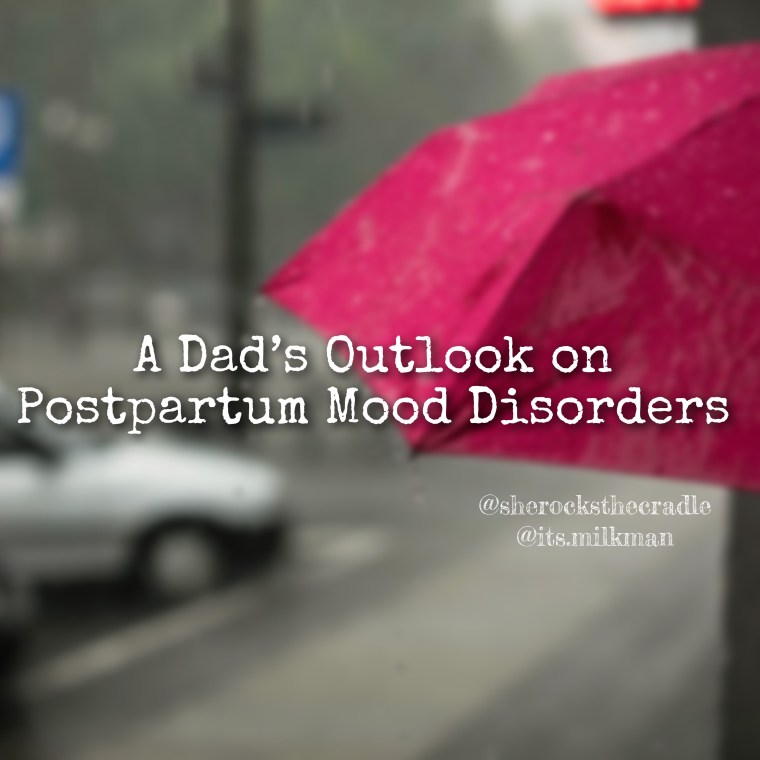
Hey Dads,
Let’s talk about something serious: Postpartum. It’s a wonderful time, after 9 months of anticipation, you have this wonderful baby that you get hold, love on, and stare at in amazement. There’s so much good that comes from having a baby! But, we’re lying if we say nothing difficult can also come out of it.
Sometimes your significant other, or even you, may experience feeling bluesy, anxious, or depressed after having a baby. There’s often a stigma associated with these things, but there shouldn’t be. It’s real, it can be serious, and when left untreated, it can lead down a scary and dangerous path. It’s estimated that 1 in 7 new mothers experience postpartum mood disorders. Before we start, realize that often what gets lumped into Postpartum Depression is actually 3 different mood disorders.
Let’s start with Postpartum Depression OR PPD, as it is commonly referred to, is just that: a state of depression after baby is born. Often brought on by a number of things including postpartum hormones, changes in amount and patterns of sleep, or the stress of caring for a helpless new baby. What does it look like?
Someone with PPD will:
• Bs sad/depressed more than they are happy, and feel disconnected from their baby.
• Have overwhelming anxiety over even the smallest of things
• Be tired with little desire to be active, and will often sleep excessively.
Next let’s look at the next thing that often gets lumped in with PPD: Postpartum Anxiety or PPA. Though Postpartum Anxiety is often labeled as depression it has some key differences that can impact how you can best support your partner in dealing with this. Like PPD, Postpartum Anxiety is anxiety brought on from the same things, hormones, lack of sleep, and a worry for your baby. But this is not an anxiety that comes and goes. It lingers.
What does it look like?
• It’s the constant fear that something bad is going to happen to your baby.
• It’s racing thoughts and excessive worrying.
• It’s a continual cycle of what ifs.
• It’s the fear of not being enough for your baby, while not wanting others to care for your baby.
• It often brings trouble with eating & sleeping
• It can also be experienced other physical symptoms associated with anxiety including panic attacks, dizziness, hot flashes, and nausea
It is important to understand and recognize that someone can have postpartum depression and postpartum anxiety simultaneously.
The third and final postpartum mood disorder is Postpartum Psychosis. This the most serious and least common of the 3, it occurs in less than 1% of new moms. Although not exclusively connected, it is often more common in moms who have dealt with bipolar disorder or had a family history of it.
How is Postpartum Psychosis different from the other two?
• Symptoms vary and can include:
-Hallucinations
-Reduced need for sleep
-Paranoia (beyond anxiety)
-Rapid mood swings
-Thoughts of suicide or infanticide
-Confusion and racing thoughts
-Delusions and strange beliefs
• It is considered a medical emergency and requires treatment
• While PPD & PPA may require medication for treatment, Postpartum Psychosis is a medical condition that is treatable with medication
So dads, you’re probably wondering “What does this have to do with me?” I’m here to tell you that you can be instrumental in supporting your wife and providing the care and help she needs postpartum.
How can you help if your wife is suffering from PPD, PPA or PPP?
First things first: Talk with her. I know this can be difficult for some men, but communication is key. As can often be the case with mood disorders, she may be in denial or not realize her condition, and may need some encouragement to get the help she needs. With Postpartum Depression and Anxiety, this process may take some time and you may not be able to broach the subject directly, you may need to sidestep a bit. However, if you suspect your wife has Postpartum Psychosis, reach out to medical professional immediately to seek treatment.
Here are some other ways to offer support:
• Let mom get some sleep (this means you may need to get up early with the kids on the weekend so she can catch up!)
• Make sure she’s eating properly
• Suggest taking a walk or other exercise so she can get some endorphins pumping
• Help her find community and support
• Encourage social interaction, whether in person or through social media
• Encourage her to meet other new moms or moms that have dealt with Postpartum mood disorders
• If appropriate, help her seek a therapist
• When needed seek professional help, or medication
• Prevention is the best medicine, if your wife has a history of depression, anxiety or bipolar disorder discuss with her doctor early on in pregnancy to get a plan in place.
• Find more information from resources like Postpartum Support International
This is not an exhaustive list, and some things may or may not work with your partner’s personality. Study her, talk to her, and most importantly? Listen. Even when she’s not talking, listen to her, encourage her, let her know she’s not alone, and she is not failing.
_______________________________________
Noah or “Milkman” is husband to Rachel at She Rocks the Cradle and father to 4 children. He co-founded a dad’s only support group on Facebook called Dadventure. You can follow his fatherhood journey on instagram at @its.milkman
